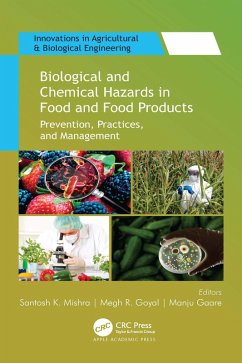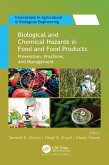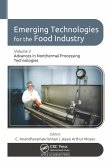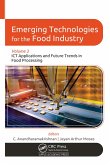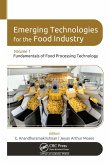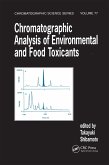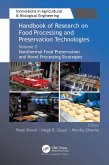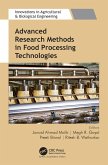Biological and Chemical Hazards in Food and Food Products (eBook, PDF)
Prevention, Practices, and Management
Redaktion: Mishra, Santosh K.; Gaare, Manju; Goyal, Megh R.
137,95 €
137,95 €
inkl. MwSt.
Sofort per Download lieferbar

69 °P sammeln
137,95 €
Als Download kaufen

137,95 €
inkl. MwSt.
Sofort per Download lieferbar

69 °P sammeln
Jetzt verschenken
Alle Infos zum eBook verschenken
137,95 €
inkl. MwSt.
Sofort per Download lieferbar
Alle Infos zum eBook verschenken

69 °P sammeln
Biological and Chemical Hazards in Food and Food Products (eBook, PDF)
Prevention, Practices, and Management
Redaktion: Mishra, Santosh K.; Gaare, Manju; Goyal, Megh R.
- Format: PDF
- Merkliste
- Auf die Merkliste
- Bewerten Bewerten
- Teilen
- Produkt teilen
- Produkterinnerung
- Produkterinnerung

Bitte loggen Sie sich zunächst in Ihr Kundenkonto ein oder registrieren Sie sich bei
bücher.de, um das eBook-Abo tolino select nutzen zu können.
Hier können Sie sich einloggen
Hier können Sie sich einloggen
Sie sind bereits eingeloggt. Klicken Sie auf 2. tolino select Abo, um fortzufahren.

Bitte loggen Sie sich zunächst in Ihr Kundenkonto ein oder registrieren Sie sich bei bücher.de, um das eBook-Abo tolino select nutzen zu können.
This volume takes an in-depth look at various biological and chemical hazards in food and food products that pose health threats. It also outlines methods and practices for the diagnosis, prevention, and management of these hazards in food production processes.
- Geräte: PC
- ohne Kopierschutz
- eBook Hilfe
- Größe: 11.03MB
Andere Kunden interessierten sich auch für
![Biological and Chemical Hazards in Food and Food Products (eBook, ePUB) Biological and Chemical Hazards in Food and Food Products (eBook, ePUB)]() Biological and Chemical Hazards in Food and Food Products (eBook, ePUB)137,95 €
Biological and Chemical Hazards in Food and Food Products (eBook, ePUB)137,95 €![Emerging Technologies for the Food Industry (eBook, PDF) Emerging Technologies for the Food Industry (eBook, PDF)]() Emerging Technologies for the Food Industry (eBook, PDF)145,95 €
Emerging Technologies for the Food Industry (eBook, PDF)145,95 €![Emerging Technologies for the Food Industry (eBook, PDF) Emerging Technologies for the Food Industry (eBook, PDF)]() Emerging Technologies for the Food Industry (eBook, PDF)145,95 €
Emerging Technologies for the Food Industry (eBook, PDF)145,95 €![Emerging Technologies for the Food Industry (eBook, PDF) Emerging Technologies for the Food Industry (eBook, PDF)]() Emerging Technologies for the Food Industry (eBook, PDF)145,95 €
Emerging Technologies for the Food Industry (eBook, PDF)145,95 €![Chromatographic Analysis of Environmental and Food Toxicants (eBook, PDF) Chromatographic Analysis of Environmental and Food Toxicants (eBook, PDF)]() Takayuki ShibamotoChromatographic Analysis of Environmental and Food Toxicants (eBook, PDF)65,95 €
Takayuki ShibamotoChromatographic Analysis of Environmental and Food Toxicants (eBook, PDF)65,95 €![Handbook of Research on Food Processing and Preservation Technologies (eBook, PDF) Handbook of Research on Food Processing and Preservation Technologies (eBook, PDF)]() Handbook of Research on Food Processing and Preservation Technologies (eBook, PDF)137,95 €
Handbook of Research on Food Processing and Preservation Technologies (eBook, PDF)137,95 €![Advanced Research Methods in Food Processing Technologies (eBook, PDF) Advanced Research Methods in Food Processing Technologies (eBook, PDF)]() Advanced Research Methods in Food Processing Technologies (eBook, PDF)128,95 €
Advanced Research Methods in Food Processing Technologies (eBook, PDF)128,95 €-
-
-
This volume takes an in-depth look at various biological and chemical hazards in food and food products that pose health threats. It also outlines methods and practices for the diagnosis, prevention, and management of these hazards in food production processes.
Dieser Download kann aus rechtlichen Gründen nur mit Rechnungsadresse in A, B, BG, CY, CZ, D, DK, EW, E, FIN, F, GR, HR, H, IRL, I, LT, L, LR, M, NL, PL, P, R, S, SLO, SK ausgeliefert werden.
Produktdetails
- Produktdetails
- Verlag: Taylor & Francis eBooks
- Seitenzahl: 358
- Erscheinungstermin: 15. Juni 2022
- Englisch
- ISBN-13: 9781000409260
- Artikelnr.: 63705147
- Verlag: Taylor & Francis eBooks
- Seitenzahl: 358
- Erscheinungstermin: 15. Juni 2022
- Englisch
- ISBN-13: 9781000409260
- Artikelnr.: 63705147
- Herstellerkennzeichnung Die Herstellerinformationen sind derzeit nicht verfügbar.
Santosh Kumar Mishra, PhD, is Assistant Professor in the Department of Dairy Microbiology at the College of Dairy Science and Technology at Guru Angad Dev Veterinary and Animal Sciences University, Ludhiana, Punjab, India. He is currently working in the area of functional foods and dairy products, incorporating live probiotics and technology of functional lactic cultures for fermented and non-fermented dairy products. He has served in the dairy industry as a Quality Assurance Executive at Mother Dairy, New Delhi, India. He is handling several externally funded projects by Indian Department of Science and Technology (DST), the Indian Ministry of Food Processing Industries, and the Indian University Grants Commission as principal investigator or co-principal investigator. He has received several awards for best paper and poster presentations. He is a recipient of junior and senior research fellowships during his master's and doctoral programs from the National Dairy Research Institute, Karnal, Haryana, India. Recently he received an Award of Honor at an international conference sponsored by Partap College of Education, Ludhiana, in association with the International Professionals Development Association, UK. He has published several research, review, and popular articles in national and international journals as well as several book chapters and teaching reviews in various training programs. Megh R. Goyal, PhD, PE, is a retired professor in Agricultural and Biomedical Engineering from the General Engineering Department in the College of Engineering at the University of Puerto Rico-Mayaguez Campus. He has worked as a Soil Conservation Inspector and as a Research Assistant at Haryana Agricultural University and Ohio State University. He was the first agricultural engineer to receive the professional license in Agricultural Engineering from the College of Engineers and Surveyors of Puerto Rico and was proclaimed as the "Father of Irrigation Engineering in Puerto Rico for the Twentieth Century" by the ASABE, Puerto Rico Section, for his pioneering work on micro irrigation, evapotranspiration, agroclimatology, and soil and water engineering. During his professional career of over 52 years, he has received many prestigious awards. A prolific author and editor, he has written more than 200 journal articles and several textbooks and has edited over 85 books. Manju Gaare, PhD, is Assistant Professor in the Department of Dairy Microbiology at GN Patel College of Dairy Technology, Sardarkrushinagar Dantiwada Agricultural University, Dantiwada, Gujarat, India. He received a BTech (Dairy Technology) from the Dairy Science College, KVAFSU, Bengaluru, India; and an MSc (Dairy Microbiology) and PhD (Dairy Microbiology) from the National Dairy Research Institute, Karnal, India. The same institute granted him junior and senior research fellowships during his master and doctoral programs. He has acquired proficiency in the field of food safety and quality assurance through his industrial, research, and teaching experience. He is a life member of several scientific societies, such as the Association of Food Scientists and Technologists India and the Probiotic Association of India. He has received best poster presenter awards at national and international conferences. He has published book chapters and several research, review, and technical articles in journals, and he holds one patent. At present he is working on novel antimicrobials for food preservation, minimal food processing, and food safety.
Part I: Biological Hazards in Foods and Food Products 1. Potential Threat
of Mycotoxins to Food Safety and Security 2. Potential Concern of Foodborne
Pathogens in the Food Industry 3. Rapid Isothermal Nucleic Acid Dependent
Techniques for On-Site Diagnosis of Foodborne Pathogens 4. Antimicrobial
Resistance in Food Grade Lactic Acid Bacteria 5. Zoonoses: Infectious
Diseases in Humans Part II: Chemical Hazards in Milk and Milk Products 6.
Milk Adulteration: Current Scenario and Challenges 7. Antibiotic Residues
in Milk: Control Strategies in Dairy Animals 8. Heavy Metal Contamination
in Milk and Milk Products 9. Detection of Pesticides Residues in Milk and
Milk Products Part III: Food Safety Hazards: Practices and Management 10.
Food Safety Management Systems in the Food Processing Industry 11. Current
Trends and Advances in Food Allergy Management 12. Anti-Nutritive and
Therapeutic Properties of Lectins 13. Recall of Food Products: Practices
and Lessons.
of Mycotoxins to Food Safety and Security 2. Potential Concern of Foodborne
Pathogens in the Food Industry 3. Rapid Isothermal Nucleic Acid Dependent
Techniques for On-Site Diagnosis of Foodborne Pathogens 4. Antimicrobial
Resistance in Food Grade Lactic Acid Bacteria 5. Zoonoses: Infectious
Diseases in Humans Part II: Chemical Hazards in Milk and Milk Products 6.
Milk Adulteration: Current Scenario and Challenges 7. Antibiotic Residues
in Milk: Control Strategies in Dairy Animals 8. Heavy Metal Contamination
in Milk and Milk Products 9. Detection of Pesticides Residues in Milk and
Milk Products Part III: Food Safety Hazards: Practices and Management 10.
Food Safety Management Systems in the Food Processing Industry 11. Current
Trends and Advances in Food Allergy Management 12. Anti-Nutritive and
Therapeutic Properties of Lectins 13. Recall of Food Products: Practices
and Lessons.
Part I: Biological Hazards in Foods and Food Products 1. Potential Threat
of Mycotoxins to Food Safety and Security 2. Potential Concern of Foodborne
Pathogens in the Food Industry 3. Rapid Isothermal Nucleic Acid Dependent
Techniques for On-Site Diagnosis of Foodborne Pathogens 4. Antimicrobial
Resistance in Food Grade Lactic Acid Bacteria 5. Zoonoses: Infectious
Diseases in Humans Part II: Chemical Hazards in Milk and Milk Products 6.
Milk Adulteration: Current Scenario and Challenges 7. Antibiotic Residues
in Milk: Control Strategies in Dairy Animals 8. Heavy Metal Contamination
in Milk and Milk Products 9. Detection of Pesticides Residues in Milk and
Milk Products Part III: Food Safety Hazards: Practices and Management 10.
Food Safety Management Systems in the Food Processing Industry 11. Current
Trends and Advances in Food Allergy Management 12. Anti-Nutritive and
Therapeutic Properties of Lectins 13. Recall of Food Products: Practices
and Lessons.
of Mycotoxins to Food Safety and Security 2. Potential Concern of Foodborne
Pathogens in the Food Industry 3. Rapid Isothermal Nucleic Acid Dependent
Techniques for On-Site Diagnosis of Foodborne Pathogens 4. Antimicrobial
Resistance in Food Grade Lactic Acid Bacteria 5. Zoonoses: Infectious
Diseases in Humans Part II: Chemical Hazards in Milk and Milk Products 6.
Milk Adulteration: Current Scenario and Challenges 7. Antibiotic Residues
in Milk: Control Strategies in Dairy Animals 8. Heavy Metal Contamination
in Milk and Milk Products 9. Detection of Pesticides Residues in Milk and
Milk Products Part III: Food Safety Hazards: Practices and Management 10.
Food Safety Management Systems in the Food Processing Industry 11. Current
Trends and Advances in Food Allergy Management 12. Anti-Nutritive and
Therapeutic Properties of Lectins 13. Recall of Food Products: Practices
and Lessons.
